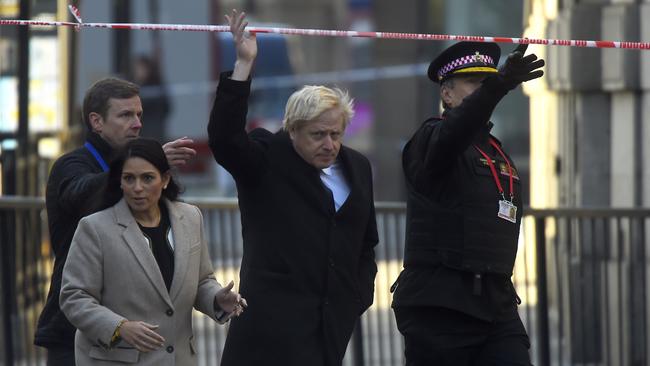London Bridge attack: Boris Johnson demands review of released terrorists
Boris Johnson has promised terrorists and other violent offenders would serve ‘every day’ of their prison sentences.

Boris Johnson has demanded an urgent review of the cases of 70 violent terrorists released from prison amid criticism of failed approaches that allowed a convicted terrorist to be in the community and to kill two people in London on Friday.
The Prime Minister promised that terrorists and other violent offenders would serve “every day” of their prison sentences, and vowed to end their automatic early release. The toughening of judicial procedures had been flagged before Usman Khan’s terrorist attack at Fishmongers Hall and London Bridge, which also injured three people.
Less than two weeks from the general election, Mr Johnson announced on Sunday that there would be mandatory minimum 14-year sentences, an end to automatic early release for terrorist and extremism offences, and a new system under which those convicted would have to serve every day of sentences handed down by judges. The government announced an immediate review of 70 released criminals.
“It does not make sense for us as a society to be putting people convicted of terrorist offences, of serious violent offences, out on early release,’’ Mr Johnson said.
“I’ve said for a long time that I think that the practice of automatic early release … simply isn’t working. You have good evidence of how that isn’t working, I’m afraid, with this case.”
Khan’s former lawyer Vajahat Sharif said the 28-year-old had been opposed to violent extremism and had written a letter asking to attend deradicalisation programs.
Khan’s grovelling 2012 letter claiming he had been immature and wanting to live as a good Muslim fooled Mr Sharif.
“He was very critical of Islamic State and what they stood for,” the lawyer said.
Islamic State claimed Khan was one of its “soldiers’’ inspired to attack the West, saying his actions were in response to ISIS calls to target citizens of coalition countries fighting in the Middle East.
The focus on security issues comes at a delicate stage of the December 12 election, with polling showing Labour is narrowing the gap with just nine points between them. The Tories want to reinforce that they are the party that can keep people safe while Jeremy Corbyn says “it is time for Britain to stop being tied to Donald Trump’s coat tails’’, insisting “the war on terror has manifestly failed’’.
Both main political parties are under scrutiny over who was responsible for the laws that allowed Khan’s early release from jail.
Seven years ago, he had been convicted of a 2010 terrorist plot to blow up the London Stock Exchange and kill Mr Johnson, then the mayor of London. Khan was released less than a year ago, without his case being reviewed by the parole board.
Khan, wearing an electronic tag, on Friday stabbed Jack Merritt, the leader of the prisoner rehabilitation conference inside Fishmongers Hall. Merritt, 25, died at the scene.
Khan was taking part in the “judicial learning’’ hosted by Cambridge University that involved criminals studying with judicial students, but he returned after the lunch break threatening to blow up the hall, wearing what was later found to be a fake suicide vest.
A woman, as yet not named, was also killed inside the hall, despite the intervention of a convicted murderer, James Ford, 42, who was on day release for a 2004 killing of 21-year-old Amanda Champion, a young woman with learning difficulties.
Minutes later, Khan was wrestled to the ground just outside the hall on London Bridge by pursuing men, including an undercover transport police officer, a Polish chef from Fishmongers Hall who had grabbed a narwhal tusk from the hall’s wall, and another man who grabbed a fire extinguisher from the same wall.
Khan’s presence at the prisoner rehabilitation session came despite the original judge having sentenced him to an indeterminate jail term for terror offences, in 2012 ruling that he was a significant threat to the public.
That terrorism trial heard how Khan had also planned to blow up pubs and clubs, discussed building pipe bombs, and wanted to set up jihadi training camps in Kashmir. He was also a known personal friend of hate preacher Anjem Choudary.
Khan’s sentence was revised in 2013 after Court of Appeal judges gave him a 16-year jail term, meaning he could be automatically released after eight years, half of his sentence.
That halving of sentences was introduced by Labour in 2005, allowing criminals to serve the second half under licence.
Jonathon Hall, a government-appointed independent reviewer of terrorism legislation, told Channel 4 that there were 29 people released up to the middle of this year who had been convicted of previous terrorism offences. He said while not all convicted terrorists would reoffend, the security services had a difficult job determining who remained a threat.
Labour leader Jeremy Corbyn said questions such as whether Khan was given a deradicalisation process needed urgent answers and called for the criminal justice system to be fully investigated.
“We have to ensure that the public are safe. That means supervision of prisoners in prison but it also means supervision of ex-prisoners when they are released ahead of the completion of their sentence, to have tough supervision of them to make sure this kind of danger is not played out on the public in future,’’ he said.




To join the conversation, please log in. Don't have an account? Register
Join the conversation, you are commenting as Logout